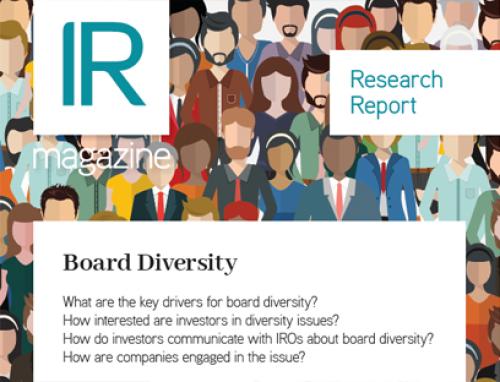Nick Rolli, IRO at Philip Morris, on the rapid changes he's experienced at the company and the future after splitting from Altria
The stories of the firm that began life as Philip Morris Companies and Nick Rolli’s career have been intertwined for some 23 years now. But while Rolli has been in more-or-less the same job, Philip Morris has been through a series of changes – from tobacco company to conglomerate (Altria) and back again (Philip Morris International) – giving its head of IR a wide range of challenges and more experience than the average IR officer gets in a lifetime.
The latest development has been the run of amicable serial divorces between the constituent companies making up the conglomerate that, for a time, comprised the Altria Group.
‘My entire career, I have worked for a company that was a beer company, a food company and a tobacco company,’ Rolli affirms. ‘I’m now bringing to bear all the experience I have acquired in public companies for Philip Morris International (PMI).’ This is the Switzerland-based company responsible for all Philip Morris’ non-US tobacco business, where he is now vice president of IR and financial communications. Back in the States, Philip Morris USA (PM USA) remains part of Altria.
Running IR for the group has certainly given Rolli plenty to keep him occupied. A few decades ago, Philip Morris faced two problems: an almost unstoppable outflow of cash, and a perennially lagging stock price dragged down by the ‘tobacco discount’. The latter reflected investors’ allowance for potentially crippling litigation awards. The former allowed the company to pay high dividends and diversify, notably by assembling food companies under Kraft and through acquisitions such as the Miller Brewing Company.
Valuation remained a problem as investors persisted in discounting the whole business as if it were a pure tobacco company, so the company renamed itself the Altria Group and changed tack. While fighting litigation, it settled with the US state attorneys-general, embraced the goal of harm reduction, signed up for much of the WHO’s tobacco control program and called for FDA regulation of its product.
Doing the splits
In 2004 Altria revealed it was considering splitting into three companies, beginning with the sell-off of Kraft. Initially just 15 percent of the Kraft holding was sold; the full spin-off had to wait for the litigation environment to improve. In October 2006 the board gave notice of its decision to distribute its remaining holding in Kraft, which it did by the end of March 2007. As a listed company, Kraft already had its own IR organization, which had cooperated closely with Altria’s, but the final share distribution ended that relationship.
Finally, in August 2007, Altria announced its plan to spin off PMI and details of the divestment were finalized in January 2008. For a dizzying three months, that meant Rolli was juggling two sets of balls, a feat complicated by the fact that the international business was not a separate public company, so did not have its own fully fledged IR operation.
‘One of my first tasks was to set up a new department for PMI while overseeing the training of IR staff for Altria,’ he recalls. The new Altria team came mostly from internal PM USA staff. ‘They were from planning, finance, communications and marketing,’ says Rolli. ‘Only one had experience with the old Altria, so for three months they cross-trained in New York with the existing IR group, developing relationships with the analysts and investors.’
Taking to the road
In IR terms, the launch of the spin-off began with a roadshow in New York in March 2008. It was a joint operation where first Altria and then PMI presented their strategies and introduced their new management teams: Louis Camilleri, former head of Altria, moved to PMI as chairman and CEO; Michael Szymanczyk was promoted to chairman and CEO of Altria. After the initial investor presentation, the two groups met key shareholders separately. A week later the teams gave a repeat performance in London, then broke off for separate investor meetings in Europe.
The split entailed more than just moving desks around the office floor: Altria moved from Park Avenue in New York to Philip Morris’ old home in Richmond, Virginia, the base for its new IR team. PMI implemented a dual structure: although its base of operations is in Lausanne, Switzerland, the company is incorporated in Virginia and legally headquartered in New York. Its stock is listed on the NYSE in New York, NYSE Euronext in Paris and on the Swiss Stock Exchange.
Rolli now heads an IR group based in both Switzerland and the US, which is home to 90 percent of shareholders. The team spends about a third of its time in the US and the US office is responsible for the annual report and the website. When IR magazine last caught up with Rolli in May, he was in the middle of a US roadshow that had also taken in the annual meeting in New York.
Organizationally, Rolli reports to Hermann Waldemer, the CFO. Julian Izant, vice president of IR, and Alex Williams, director of IR and financial communications, were recruited internally; Rolli plans to beef up the team, hiring another international IR professional in due course.
The NYSE listing apart, another reason to keep a US address was inclusion in the S&P 500. ‘This was an important goal for us,’ Rolli says. ‘We met all the criteria for inclusion, except one: we have no US-based revenues.’ However, the S&P committee saw the advantages of having PMI in the S&P 500 index, where it currently ranks in the top 25 by market capitalization.
As each Altria shareholder received PMI stock on a one-for-one basis, it’s not surprising PMI’s shareholder base has remained stable, particularly since securing inclusion in the index. ‘In fact, many of our top investors have increased their holdings,’ Rolli notes. He accepts, however, that there is likely to be a growing reorientation, already visible, as value investors look more to Altria while growth players gravitate toward PMI.
Spreading its wings
Rolli also notes that, with operations in some 160 countries, ‘in the long term we would like to expand our non-US shareholder base’, explaining that the Euronext listing is more to do with providing a platform for investor outreach than a need for liquidity.
PMI positions itself as the largest, most profitable tobacco company but looks at more than just companies like Reynolds or BAT. ‘We benchmark ourselves against top-performing global consumer products firms, like Procter & Gamble and Nestlé,’ Rolli says.
The road to increasing international ownership requires ‘a consistent approach to investor communications, including a structured and systematic outreach using not only our CEO, CFO and COO as spokespeople, but also the managing directors of key country businesses,’ says Rolli. He notes that international sell-side coverage has increased to a dozen or so analysts, about half of them based in London. He also plans more targeting of investors that own competitors’ and comparators’ stock.
Overall, Rolli is happy about the splitting of Altria and PMI, and expresses great satisfaction in crowning his IR career with his role at the new spin-off. ‘There were many reasons for it, one of which was to focus on growth opportunities internationally,’ he says. ‘Our strong performance against the broader market is what makes PMI such a compelling investment, and I consider myself privileged to be part of that story.’
What the analysts say
‘As a consumer of its information, I would say the firm managed the transition very well. The release from American litigation has freed up its resources and allowed it to talk more about the positive aspects; as a result, it is freer with information than before. It has listened pretty well to what we requested in terms of more details about the company, which it began early on and increased steadily as it went through the spin-off.’
Erik Bloomquist, JPMorgan
‘In the past, Altria’s investor relations focused on the US and on tobacco litigation; the international cigarette business was not exposed that much. That’s changing but there’s still some way to go. Now it will want to work harder on providing information about the individual markets. It doesn’t yet provide as much as its competitors, such as BAT and Imperial.’
Analyst who wishes to remain anonymous










